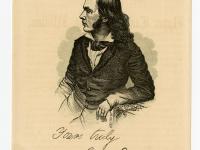Answer: The Brotherhood of the Union
George Lippard (1822-1854) was born in West Nantmeal Township, Chester County, Pennsylvania, on a farm owned by his father. After suffering a debilitating manual labor injury, the Lippard patriarch moved the family to Germantown where they would live with George’s grandfather and two unmarried aunts.
As a boy, Lippard found solace in religion. He attended the Classical Academy in Rhinebeck, New York, where he considered a career as a Methodist minister. When his father died in 1837 George was not granted a portion of the $2,000 dollar inheritance his parent had left behind. Lippard found himself penniless, homeless, and forced to live on the streets of Philadelphia. This experience factored heavily into the development of his sympathies towards the working class.
To support himself after his father's death, he apprenticed in a law firm, but never went onto a career in the field. Despite early hardships, Lippard turned to writing and became one of the bestselling authors of the early 1800s with works such as The Quaker City: or The Monks of Monk Hall (1844), Washington and His Generals; or, Legends of the Revolution (1847), and The Killers: A Narrative of Real Life in Philadelphia By a Member of the Philadelphia Bar (1850).
Out of Lippard’s concern for the American worker grew the Brotherhood of the Union (later the Brotherhood of America), which he founded in the mid 1800s. He envisioned that this secret charity would help unify workers and advance their interests through mutually beneficially social and economic activities. The Brotherhood, which grew rapidly in its early years, supported several different labor reforms, including shorter workdays and educational and political reforms. This organization continued to grow for well over 100 years, until it disbanded in the late twentieth century.
Lippard died in Philadelphia from tuberculosis in 1854 at the young age of 31. He is buried at Lawnview Cemetery in Rockledge, Pennsylvania.
HSP’s collection of Joseph Jackson papers (#314) contains some materials on George Lippard, and the society also has an 1884 copy of the Order of the Brotherhood of the Union rules for installation ceremonies (Am .09255). The Library Company of Philadelphia’s collection of Brotherhood of the Union records can also be accessed at the society.

